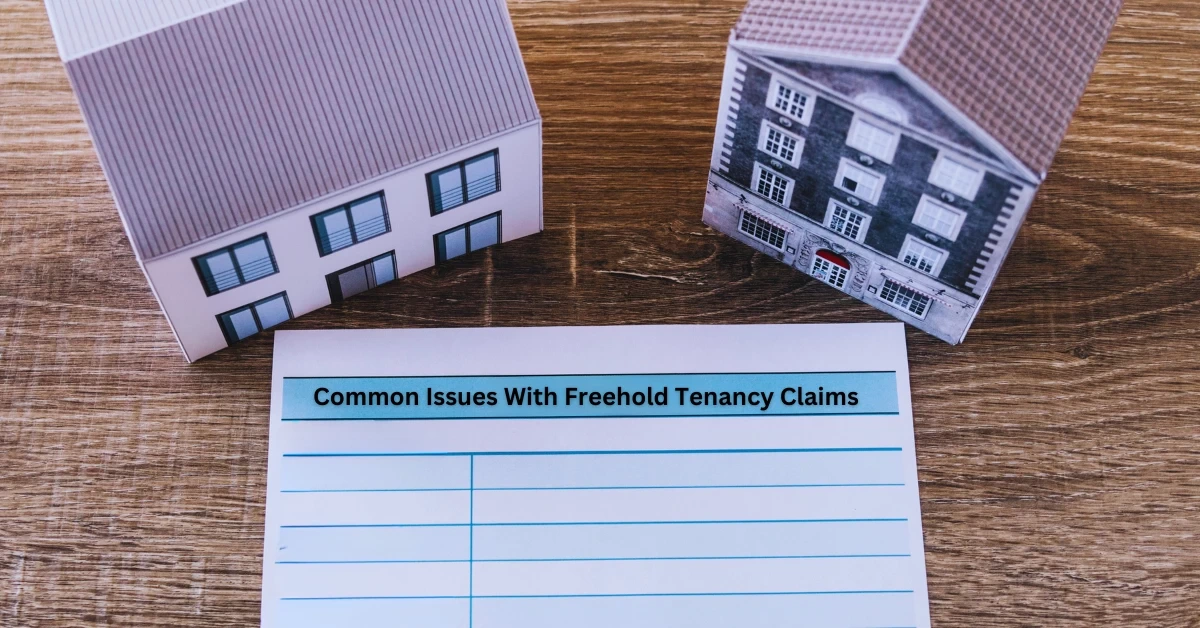A freehold tenant is a property owner who holds the title to real estate indefinitely, without a predetermined lease period. They have full ownership rights and can use, sell, or transfer the property as they wish, subject to local laws and regulations.
Freehold tenancy is a concept under property law and is often equated with ownership. It is a legal arrangement where the tenant owns the land and buildings outright until they decide to sell or pass it on.
Freehold tenants have full control of their homes, including the freedom to make any modifications without seeking permission from a landlord.
This type of ownership is common in single-family homes and townhouses. The alternative to a freehold tenant is a leasehold tenant, which is a tenant who does not own the property but has the right to live or use the property for a set period of time.

What Is Freehold Tenancy?
Freehold tenancy is a type of ownership in which a person owns both the land and the building on that land until they decide to sell it or pass it down to someone else.
It is a form of permanent ownership, unlike other forms of tenancy like leasehold or rental agreements that only offer temporary rights to occupy the property.
Here are some key points regarding freehold tenancy:
- It allows the owner to make any modifications to the property they see fit, without seeking permission from any other party.
- The owner is responsible for all repairs and maintenance to the property.
- You only need planning permission from your local council in certain circumstances, such as if you want to build a significant extension.
Legalities Surrounding Freehold Tenancy
Understanding the legal aspects of freehold tenancy is crucial when considering becoming a freehold tenant.
It is important to understand what you should expect from the process and what rights are involved.
Some legal aspects to consider include:
- The conveyancing or transfer process involves legal fees, land registry and stamp duty land tax, which can make it quite costly.
- There is an obligation for the landowner to pay for upkeep, repairs, and maintenance of the property.
- Freeholders are usually automatically part of the local authority’s homeowners’ association, which charges an annual fee for various services such as trash collection and street lighting.
Benefits Of Freehold Tenancy
Freehold tenancy has its advantages, and it’s worth considering them if you’re weighing your options about which type of ownership to pursue.
Some benefits of freehold tenancy include:
- You have complete control over how you use your property and make any necessary changes, without requiring permission from others.
- Unlike leasehold arrangements, there are no restrictions on transferring ownership. You have total freedom to sell your property at any time or pass it down to someone else through your will.
- There is a high potential for significant capital gains if the value of the property increases over time, increasing your net worth.
Differences Between Freehold Tenancy And Leasehold Tenancy
When it comes to renting a property, there are two common types of tenancy agreements: freehold and leasehold.
Freehold tenancy provides the tenant with a greater degree of ownership and control over the property compared to a leasehold agreement.
To help you understand the differences between freehold and leasehold tenancy agreements, let’s dive into each one, shall we?
Pros And Cons Of Freehold Tenancy Versus Leasehold Tenancy

Freehold Tenancy:
Pros:
- The tenant has complete ownership of the property and can do what they please with it.
- No need to pay rent and the property can be used for long-term investment purposes.
- Greater flexibility in terms of making alterations and renovations without needing permission from the landlord.
- No service charge or ground rent fees are to be paid.
Cons:
- The tenant bears the responsibility for maintenance and repair costs on the property.
- When the tenant decides to sell the property, it falls on them to find a buyer.
- Property prices tend to be higher in comparison to leasehold properties.
Leasehold Tenancy:

Pros:
- Tenant escapes the responsibility of repair and maintenance.
- Lower initial costs to be paid as compared to freehold property purchase.
- The tenant has more legal protections under this type of tenancy agreement.
- Property can be sold to a wider range of buyers.
Cons:
- The landlord has greater control over the property in leasehold agreements.
- Service charges and ground rent fees must be paid.
- The tenant has less freedom when it comes to making alterations or renovations.
How To Choose Between Freehold Tenancy And Leasehold Tenancy
When it comes to deciding on which type of tenancy is best suited to your needs, consider the following factors:
- The length of time you intend to remain in the property.
- Your financial situation, both currently and in the future.
- Any upcoming renovations or alterations that you’d like to make to the property?
- Your ability to bear the responsibility of maintenance and repair costs.
Ultimately, the decision of whether to go with a freehold or leasehold agreement depends on your individual circumstances.
It’s important to do your research, seek advice, and consider what’s best for your present and future needs.
Legal Framework For Identifying Freehold Tenants
Freehold tenants are individuals who own a property outright and have complete control over it.
However, there are specific legal frameworks that define the concept of freehold tenancy.
Laws For Freehold Tenants
In countries like the united kingdom, freehold tenancy is regulated by law. The common law recognizes the right of the freehold tenant to unlimited ownership of the property.
In the united states, freehold tenancy is regulated by state law.
Jurisdictions With Provisions For Freehold Tenants
There are various jurisdictions worldwide with varying laws on freehold tenancy.
The countries that recognize freehold tenancy include the united kingdom, Canada, and the united states.
Others like Australia, hong kong, and Singapore also recognize the concept of freehold tenancy.
What Qualifies A Property As Freehold Property
Not all properties can qualify as freehold property. A property must satisfy specific conditions to be considered freehold property. These conditions include:
- The property must be owned outright.
- The owner must have complete control over the property.
- There must be no limitation on the owner’s rights to the property.
When identifying freehold tenancy, it is essential to consider these conditions to differentiate it from a leasehold or rental property.
Freehold tenancy provides complete ownership and control of the property to the owner.
The legal framework, laws, and conditions play a significant role in defining freehold tenancy.
Understanding the concept better can help individuals make informed decisions when purchasing or dealing with freehold properties.
Steps For Identifying Freehold Tenants

How To Check If Your Property Is Freehold
Freehold property is a type of real estate ownership where the owner has complete control over the land and buildings on it, and they can hold onto it without any specific time limit.
Identifying if your property is freehold or leasehold can be a bit confusing, but here are some steps that can help you check whether your property is freehold:
Check the property title documents
If you own a freehold property, the title documents should state that the property is freehold. You can check this document yourself or get a lawyer to do it for you.
Check for any lease agreements
Lease agreements are usually prepared when the property is leasehold. If you have a lease agreement for the property, it means that you are a leasehold tenant.
ground rent and service charges
If you don’t pay ground rent or service charges, it is more likely that the property is freehold.
Check with the land registry
You can verify the status of your property, freehold or leasehold, by contacting the land registry.
How To Determine If You Are A Freehold Tenant
If you own a freehold property, it means that you are a freehold tenant. There are some ways to identify if you are a freehold tenant:
complete control of the property
As a freehold tenant, you have total control of your property.
You can decide how to use it, make any modifications or improvements as you desire, and you don’t have to pay ground rent or service charges.
the maintenance of the property
Since you have complete ownership of the property, you are responsible for maintaining it. You have to bear all the expenses and do timely repair work whenever needed.
don’t have to renew any lease
Unlike leasehold tenants, freehold tenants don’t have to worry about renewing the lease after a specific time period. You can live on the property as long as you want.
Comparing And Contrasting Between Freehold And Leasehold Tenants
While freehold and leasehold ownership are both types of real estate ownership, there are some key differences.
Here is a side-by-side comparison of freehold and leasehold tenants:
| Feature | Freehold Tenant | Leasehold Tenant |
| Ownership | No restrictions on the use, modifications, or sale of property | Ownership is held by the freeholder, which can restrict usage and modifications |
| Duration | Unlimited duration | Limited by the lease |
| maintenance | Responsible for all maintenance and repair work | Usually less responsible as freeholder takes care of shared areas |
| Ground rent | Not applicable | Usually has to pay ground rent |
| Service charges | Not applicable | Usually has to pay service charges |
| Restrictions | No restrictions on use, modifications, or sale of property | Can be limited by lease, such as denying ownership transfer or preventing modification |
Common Issues With Freehold Tenancy Claims

Overview Of Common Issues
Freehold tenancy claims can be complex and confusing. Here are some of the most common issues that arise:
- Lack of clarity in the terms of the tenancy agreement.
- Disputes over the extent of the tenant’s rights.
- Failure to properly register the tenancy with the land registry.
- Disputes over the payment of service charges.
- Lack of clarity over the boundaries of the property.
How To Address Some Of These Issues
If you encounter any of these issues, there are several steps you can take to address them:
- Review the terms of the tenancy agreement carefully and seek legal advice if necessary.
- Attempt to negotiate a resolution with the landlord or tenant.
- Register the tenancy with the land registry as soon as possible.
- Seek advice from a solicitor if there are disputes over service charges.
- Consider obtaining an independent surveyor to resolve boundary issues.
Litigation Procedures
If attempts to resolve these issues through negotiation or alternative dispute resolution fail, litigation may be necessary.
Here are the typical steps involved in litigating a freehold tenancy claim:
- Pre-action protocol – parties exchange information and try to settle the dispute before going to court.
- Issue of proceedings – if the pre-action protocol fails, one party will make an application to the court.
- Directions stage – the court will give directions for disclosure, witness statements, etc.
- Trial – evidence is given and a judge decides the case.
If you are involved in a freehold tenancy dispute, understanding the common issues that arise and taking steps to address them can help avoid the need for litigation.
However, if a dispute cannot be resolved through negotiation or alternative dispute resolution, the litigation process can be used to resolve the matter.
Frequently Asked Questions On Which Of The Following Is A Freehold Tenant
What Is A Freehold Tenant?
A freehold tenant is someone who owns the land and property outright, without any time constraints.
What Are Some Characteristics Of A Freehold Tenant?
A freehold tenant has full ownership of the land and property, can make modifications and alterations without seeking approval, and has the right to sell or transfer the property.
How Does A Freehold Tenant Differ From A Leasehold Tenant?
A freehold tenant owns the land and property outright, while a leasehold tenant has a contract allowing them to use the property for a specific time period. Leasehold tenants are subject to the terms of the lease agreement and require landlord approval for modifications.
What Are Some Advantages Of Being A Freehold Tenant?
As a freehold tenant, there is no risk of losing the property if unable to meet rent obligations, no need to renew lease agreements, and the ability to make changes to the property without seeking landlord approval.
Conclusion
After journeying through the labyrinth of property terms, you’ve come face-to-face with the freehold tenant, the full master of their estate.
With this title, you command your property unencumbered, basking in the freedom of unlimited tenure. Explore, build, pass on – your realm, your rules.
